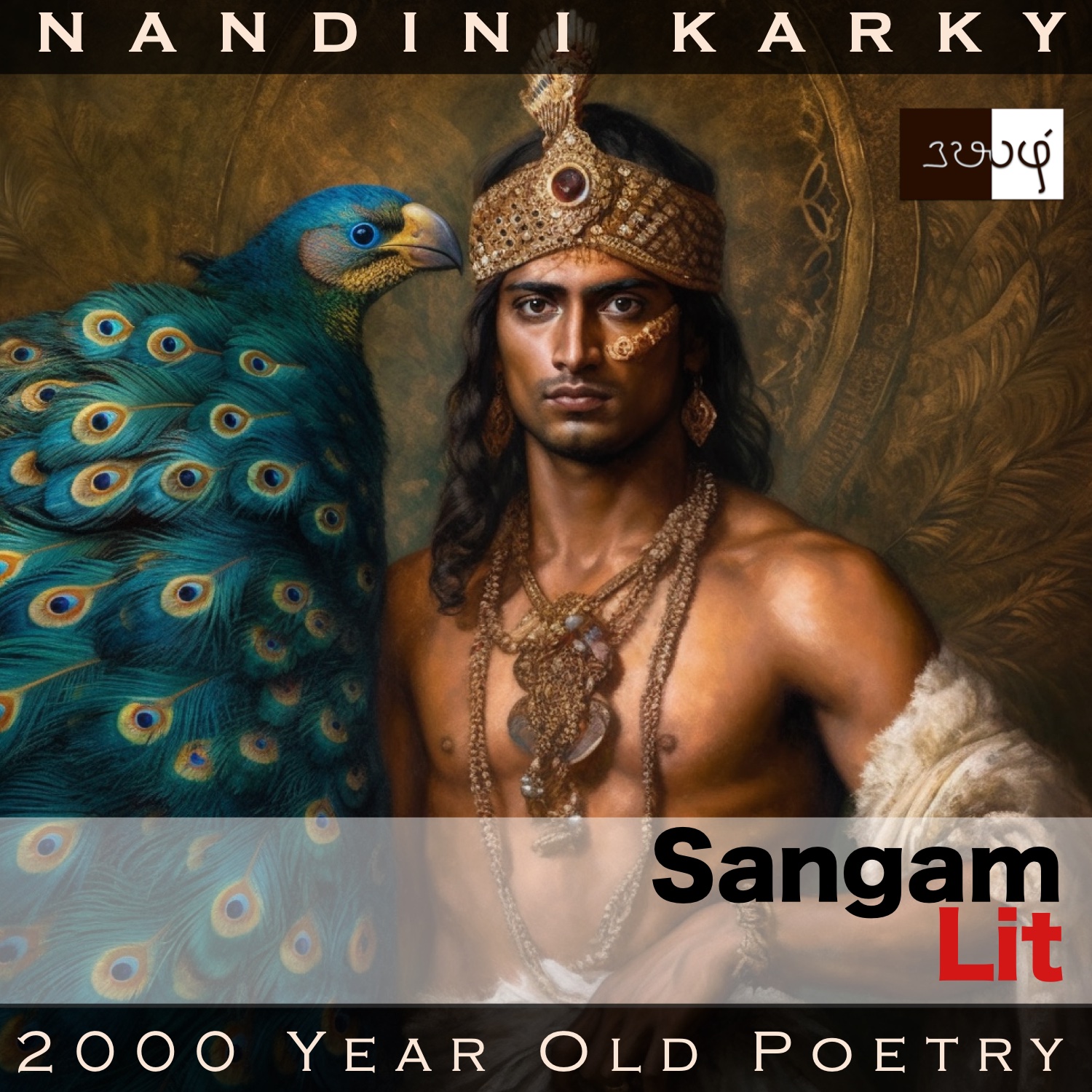Podcast: Play in new window | Download
Subscribe: Apple Podcasts | Spotify | Amazon Music | Android | iHeartRadio | Email | TuneIn | RSS | More
In this episode, we perceive the nuances in charity rendered unto others, as depicted in Sangam Literary work, Puranaanooru 141, penned about the Velir King Vaiyaavi Koperum Bekan by the poet Paranar. Set in the category of ‘Paadaan Thinai’ or ‘King’s praise’, the verse directs a fellow bard to a king’s court.

‘பாணன் சூடிய பசும் பொன் தாமரை
மாண் இழை விறலி மாலையொடு விளங்க,
கடும் பரி நெடுந் தேர் பூட்டு விட்டு அசைஇ,
ஊரீர் போலச் சுரத்திடை இருந்தனிர்!
யாரீரோ?’ என, வினவல் ஆனா,
காரென் ஒக்கல், கடும் பசி, இரவல!
வென் வேல் அண்ணல் காணா ஊங்கே,
நின்னினும் புல்லியேம் மன்னே; இனியே,
இன்னேம் ஆயினேம் மன்னே; என்றும்
உடாஅ, போரா ஆகுதல் அறிந்தும்,
படாஅம் மஞ்ஞைக்கு ஈத்த எம் கோ,
கடாஅ யானைக் கலி மான் பேகன்,
‘எத் துணை ஆயினும் ஈத்தல் நன்று’ என,
மறுமை நோக்கின்றோ அன்றே,
பிறர், வறுமை நோக்கின்று, அவன் கை வண்மையே.
We get to meet a new king in our Puranaanooru travel and the introduction is being done by none than than the celebrated historian-poet of Sangam times, Paranar. The poet’s words can be translated as follows:
“You say to me, ‘Along with bards, whose heads are crowned by golden lotuses, and dancing maiden with well-etched ornaments, who glow with garlands, you appear here. You have freed the speeding horses from your tall chariot to let them roam free in these drylands, and you appear at ease as if you were at your town. Who can you be?’! You ask me so, O supplicant with dreadful hunger and downtrodden kin. Before I saw the esteemed leader, renowned for his indefeasible spear, I was in a worse state than you. But now, I have attained this state.
Knowing fully well that it would never wear it, my lord granted unto that beautiful peacock, his own shawl. He is known as ‘Bekan’ – the one who possesses raging elephants and racing horses. He does not think of the afterlife and say ‘It’s good for me to render charity endlessly’ but rather acts with a thoughtful generosity when seeing the poverty of those before him.”
Time to delve into the nuances of these words to a colleague! The poet starts with the words of another. This other person is first describing the people who are accompanying the poet. There are bards, who seem to be wearing lotuses, glinting in the sun, for they are made of gold. And we remember how this was the object considered as a bard’s crowning glory. Then, from the male members, the person turns to women wearing well-crafted ornaments and adorned with garlands. They are the ‘Viraliyar’ or the singing-dancing maiden, who accompany bards and poets to the king’s court. Not only are the humans around this poet in such a radiant state, even the horses that have been let out of rein from a tall chariot, are comfortably grazing. After registering the rich and relaxed state of this poet, the questioner wonders out aloud who such a well-to-do personality, who appears much at ease in those dreary drylands as if it were his own town, could be!
Now, the poet reveals who that other person is, by addressing him as a poor bard, whose hunger and presence of impoverished kith and kin is very much evident. He adds that he may now be seen in such a glowing state, overflowing with wealth, but before, he too was like that hungry bard, why in fact, in an even worse state. All this changed after he met the great Bekan, the poet tells the bard and narrates a story which seems to be of common knowledge then. One, wherein seeing a peacock spread out its feathers and dance, either astonished by its beauty or thinking that it’s shivering, this king seems to have taken the shawl around his shoulders and offered to that peacock, knowing fully well that it will not cover itself with it. And so, narrating this defining story, the poet nudges the bard to go to that king’s court and concludes with the words that the king renders charity not because he thinks that it will be good for him in the afterlife but because he truly sees the poverty of those who come seeking to him!
The highlight of this verse is in how kings had the power to change the state and fate of anyone they encountered. You go a beggar and return a prince, the poet seems to say to that other bard! In that anecdote about the king rendering his shawl to a peacock, there’s a hidden message that the king will give unto a supplicant, things that they never even expected. And finally, there seems to be a distinction between someone, who gives charity selfishly thinking of his own afterlife, and one, who was focussed on the people of the present and their circumstances. Not a calculated act, but something from the heart, seems to the choice praise accorded to patrons of that era. Words that nudge us towards a selfless generosity that seeks no benefit for oneself, in this life or any after it!




Share your thoughts...